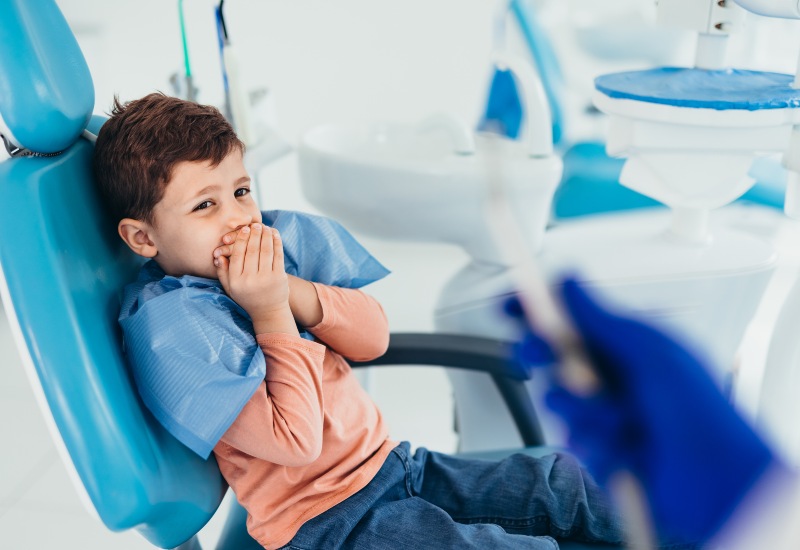How to Help Children Overcome Dental Anxiety
Dental visits can be nerve-wracking for young children, but understanding and addressing dental anxiety early is crucial to building a positive relationship with oral health. Germantown Advanced Dentistry wants to help children learn how to deal with dental anxiety.

Germantown Advanced Dentistry provides comprehensive insights into dental anxiety in children, its causes, signs, and actionable steps you can take to ease your child’s fears before, during, and after their dental appointments. Contact us today to learn more about easing dental anxiety in children.
What Is Dental Anxiety in Children?
Dental anxiety in children refers to a fear or stress related to dental visits or procedures. Unlike a simple reluctance, dental anxiety can result in extreme avoidance or distress when scheduled for an appointment. Such fears may stem from past experiences or fear of the unknown, and they can hinder a child’s ability to maintain proper oral health.
What Causes Dental Anxiety?
Understanding the underlying causes of dental anxiety can help you address it effectively. The most common factors of dental anxiety in children include:
- Fear of Pain: Children may anticipate discomfort, especially after watching TV shows or hearing stories from others.
- Unfamiliar Environment: The dental office can be intimidating for a child, with unfamiliar sounds, smells, and equipment.
- Parental Anxiety: If parents exhibit their own dental fears, children may sense and mimic these behaviors.
- Previous Negative Experiences: A distressing past visit can cause long-lasting fear.
- Loss of Control: Children may feel helpless and vulnerable sitting in a dental chair.
Recognizing Signs & Knowing When to Act
Children may not always express their anxiety verbally, so it’s important to recognize the signs. These may include crying, clinging to a parent, complaints of stomachaches before visits, or outright refusal to attend appointments. If anxiety prevents your child from receiving needed care, it’s time to act. Look out for patterns of avoidance or behavioral changes as key indicators.
Preparing Before the Appointment
Preparation is key to reducing dental anxiety. Here are some tips to make the experience smoother:
- Start Early: Introduce your child to the dentist at a young age to foster familiarity.
- Role-Play: Pretend to be the dentist at home, walking your child through an imaginary dental appointment.
- Offer Explanations: Use age-appropriate language to explain what will happen during the visit.
- Read Books or Watch Videos: Share stories or videos about positive dental visits to create excitement.
During the Dental Visit: Techniques to Ease Anxiety
A supportive approach during the visit can make a world of difference for an anxious child. Some tips to ease anxiety during the dental visit include:
- Communicate With the Dentist: Inform the dental team about your child’s fears so they can adjust their approach.
- Stay Calm: Your child will follow your emotional cues. Stay reassuring and upbeat throughout the visit.
- Bring Comfort Items: A favorite toy or blanket can help your child feel secure.
- Positive Reinforcement: Praising small successes, such as sitting in the chair, can encourage cooperation.
After the Appointment & Reinforcement
Once the visit is over, reinforcing positivity is crucial. Celebrate your child’s bravery, no matter how the appointment went. Offer small rewards like stickers or using their favorite activity as motivation. Additionally, discuss the experience to identify fears and reassure them that future visits will be even better.
Long-Term Strategies & Support
Building a positive attitude toward dental care takes time, but establishing healthy habits early will serve your child well into adulthood. Consider the following strategies for long-term support:
- Regular Visits: Schedule routine check-ups to make dental visits a normal part of your child’s life.
- Teach Good Oral Hygiene: Educating your child on proper brushing and flossing habits can reduce worry about dental issues.
- Model Positive Behavior: Demonstrating a calm, matter-of-fact attitude about dental visits can influence your child’s perspective.
- Encourage Questions: Empower your child to ask their dentist questions to foster a sense of control.
Choose Us to Help Your Child Overcome Dental Anxiety
At Germantown Advanced Dentistry, we prioritize creating a stress-free environment for children. Our skilled and caring team specializes in easing dental anxiety through gentle techniques, kid-friendly explanations, and patient-specific approaches. We’ve designed our practice to feel welcoming, focusing on creating trusting relationships with you and your child.
Contact Germantown Advanced Dentistry
Germantown Advanced Dentistry understands the importance of lowering dental anxiety in children. By understanding its causes, recognizing the signs, and implementing practical strategies, you can help your child develop a healthy relationship with dental care. At Germantown Advanced Dentistry in Germantown, TN, we’re here to support you every step of the way. If you’re looking for a compassionate and child-focused dental experience, schedule an appointment with us today.
Frequently Asked Questions
- How do I know if my child has dental anxiety? Look for signs like crying, clinging, or refusal to attend appointments. Behavioral changes and avoidance tactics are also red flags.
- Can dental anxiety affect my child’s oral health? Avoidance of dental visits can lead to poor oral hygiene and untreated issues, making regular check-ups even more critical.
- How soon should I take my child to the dentist? The American Dental Association recommends scheduling a dental visit by your child’s first birthday or when their first tooth appears.
- What if my child had a bad experience before? Communicate with your new dentist about previous fears. Pediatric dentists are skilled in rebuilding trust with gentle and positive interactions.
- Can parents help reduce dental anxiety at home? Role-playing, discussing visits calmly, and modeling proper oral care can significantly alleviate fears.
